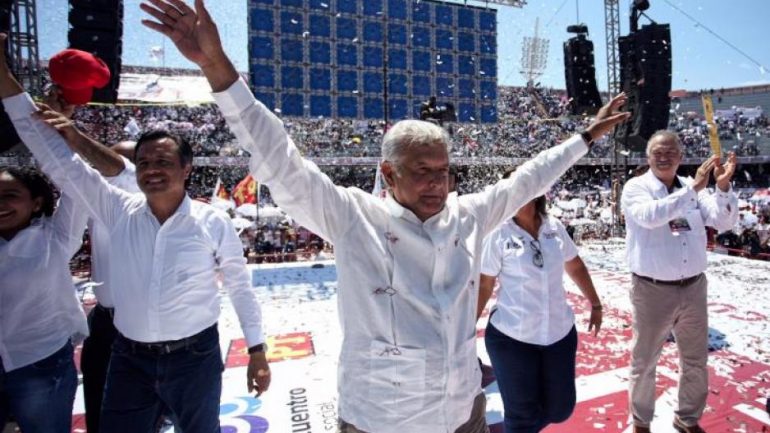Promising a "radical change", Mexican left-wing candidate Andres Manuel Lopez Obrador hopes to make history today by securing a landslide victory in Mexico's undisputed favorite.
"This will be a historic development, the victory of an entire people over the immorality and decline of recent years," Lopez Obrador told supporters at his last major election rally in Mexico's iconic Asteka Stadium.
At the age of 64, AMLO, as most Mexicans call him, from the acronym of his name, is presented as an anti-systemic candidate but also an opponent of corruption. His goal, he says, is to oust "the mafia from power."
After two failed attempts, this time he is credited with a lead of 20 or more points in the polls against his opponents, the candidates of the traditional ruling parties.
He is followed by the relatively young, conservative politician Ricardo Anagia, who promotes himself as a "modernist", leading a center-right-center-left alliance (with the PAN, PRD and Movimiento Ciudadano parties). In third place is Jose Antonio Mead, who was elected despite being politically independent and a technocrat from the ruling Institutional Revolutionary Party (PRI).
"We tried PRI and PAN and it was a disaster, it's time for a change, it's time for MORENA" (Movimiento Regeneracion Nacional, National Revival Movement), says Carlos Miguel Salinas, a 26 - year - old physical education teacher.
Lopez Obrador capitalizes on the widespread frustration of Mexicans following the tenure of Enrique Pena Nieto marked by corruption, human rights abuses and further escalation of violence.
If the predictions come true, today's election will mark a turning point in Mexican political life.
"Some compare this turn to an earthquake, others see it as a structural change. "What is certain is that the traditional party system is being shaken by the momentum of MORENA," said Duncan Wood, director of the Mexico Institute at the Woodrow Wilson Center.
In addition to the president, the estimated 89 million Mexican voters are called upon to nominate more than 18.000 elected officials at the same time, from 500 lawmakers and 128 senators to state officials and mayors.
The election campaign, which began last September, proved to be the "bloodiest" in Mexican history, with 136 politicians assassinated, including 48 candidates, according to consulting firm Etellekt. That number is huge compared to the 2012 campaign, when nine politicians and one candidate were assassinated.
The level of violence in the country is such that many Mexicans say they are afraid to go to the polls: "We are afraid we will not come back alive", explains Margarita Rodarte, a resident of Ciudad Juarez (north), one of the Mexican cities that have become devils. because of gang violence.
Tackling violence and corruption is among AMLO's priorities. The former mayor of Mexico (2000-2005) also promises to work to reduce poverty, which creates fertile ground for drug cartels, and wants to fight corruption to fund social programs.
His proposal to grant amnesty to petty criminals working for the cartels sparked war. "Amnesty does not mean impunity," he said.
He promises to form a government "austere, without luxuries, nor privileges", which will reduce by up to 50% the salaries of senior and top government officials, including his own salary. According to him, he promises to transform the presidential residence of Los Pinos, which is "haunted", into a cultural center.
Many Mexicans and analysts, however, criticize the fact that he does not seem to have a clear policy, or specific proposals, and resort to "populist", vague rhetoric. On the right, many fear he will lead the country on the road to Venezuela, something he rejects, as have his administration, which has assured investors and market participants that Lopez Obrador is in fact center-left.
Many also wonder what Lopez Obrador's relationship with Donald Trump will be. The next president of Mexico will inherit problems that are burning - from the immigrant crisis to the renegotiation of the free trade agreement in North America, NAFTA - and remain on the table.
Trump is threatening to drag the United States and other parts of the deal into a costly trade war, and Mexico's insistence on paying for the wall it wants to erect on the two countries' borders has angered many Mexicans.
